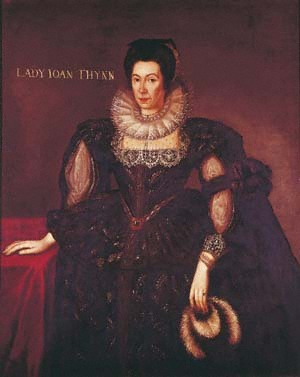Joan Thynne facts for kids
Quick facts for kids
Joan Thynne
|
|
|---|---|

by an unknown artist
|
|
| Born |
Joan Hayward
baptised 1558 |
| Died | 3 March 1612 (aged 53–54) |
| Nationality | Kingdom of England |
| Occupation | gentlewoman |
| Spouse(s) | John Thynne |
| Parent(s) | Lady, Joan (born Tyllesworth) and Sir Rowland Hayward |
Joan, Lady Thynne, born Joan Hayward (1558 – 3 March 1612), was an important English gentlewoman. She was known for actively managing and defending her family's properties, like Caus Castle. A disagreement over her son's secret marriage is even thought to have inspired Shakespeare's famous play Romeo and Juliet. Joan fought against this marriage for seven years. She never truly forgave her son and later took him to court again.
Contents
Early Life and Family
Joan Hayward was born in 1558. Her parents were Lady Joan (born Tyllesworth) and Sir Rowland Hayward. Her father was a very important person; he was the first Lord Mayor of London. Joan's mother passed away in 1580. Her father then remarried, and Joan gained three brothers and two sisters.
Marriage and Property Management
Joan had an arranged marriage with John Thynne. They had two sons, including Thomas. As part of their marriage agreement, Joan's father gave them property, including Caus Castle. However, another noble, Edward Stafford, 3rd Baron Stafford, claimed he owned the castle. He would not let Joan and John move in.
Joan was a very active partner in her marriage. She helped her husband with many decisions. She gave advice on how to handle problems and managed legal fights over their property.
Defending Caus Castle
In 1591, Joan and John Thynne took Caus Castle by force. After this, Joan lived at Caus Castle while John stayed at Longleat House. Their letters show how much they worked together. Joan managed many parts of their estate. She not only managed the castle but also defended it. She even kept guns and gunpowder in her bedroom to protect it!
Family Disputes and Legacy
In 1594, Joan's son Thomas secretly married Maria Tuchet. Maria was the daughter of Lord Audley. Joan did not approve of this marriage. She tried to have it canceled, but she was not successful. This family dispute is believed to have helped inspire Shakespeare's play Romeo and Juliet.
The argument over the marriage was finally settled in 1601. A judge named Daniel Donne ruled against Joan's claims. When her husband John died in 1604, Longleat House went to her daughter-in-law, Maria Thynne. Joan never forgave her son. In 1605, she took him to court again on behalf of her daughters.
Joan was also a supporter of the arts. A composer named John Maynard dedicated his music to her in 1611. It was called The XII Wonders of the World.
Later Life and Death
Joan Thynne died suddenly in London in 1612. She had made careful plans for her death in her will. Her daughters were supposed to manage her will, not her son. However, they faced problems because there was not enough money to give out all the gifts she had planned.
 | George Robert Carruthers |
 | Patricia Bath |
 | Jan Ernst Matzeliger |
 | Alexander Miles |

